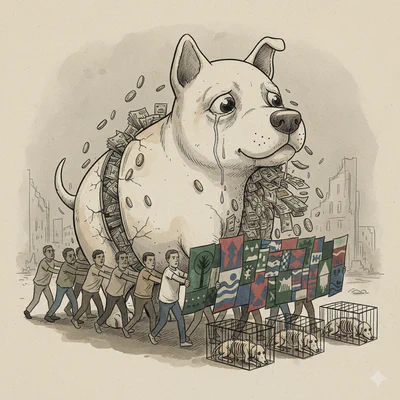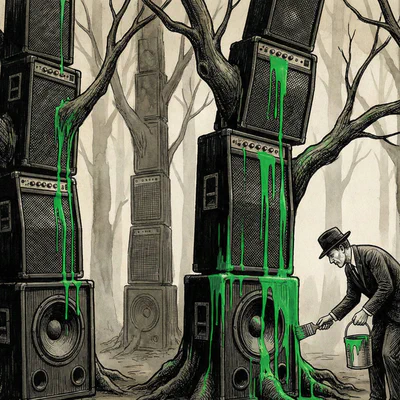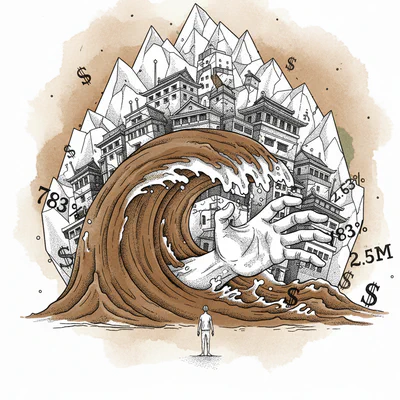Animal carcasses rotting for a decade at the Opole ZOO and a director who 'knew nothing about it.' This isn't just a scandal. It's a public admission of gross negligence and a collapse of standards. Who is responsible for this horror, and why is resignation the only way out?
Table of Contents
Perhaps some of you have heard about the shocking case of the Opole ZOO, where a freezer malfunction revealed unrecorded animal carcasses that had been decomposing for a decade. Such news is horrifying. However, even more disturbing is the public attempt by the current director, Aleksandra Czechowska, to shed responsibility, stating that she “cannot be responsible for the previous director.” I am also amazed at the ease with which journalists report the facts instead of determining who is actually responsible. Such a declaration is not only an expression of a fundamental misunderstanding of corporate responsibility principles but, above all, a public admission of gross negligence that should result in immediate dismissal, and perhaps even prosecution.
A mess in municipal companies - who is responsible for what?
I’d like us to analyze this case because it reveals something quite characteristic of many municipal companies. The current director’s argument is based on a simple but logically flawed assumption: “I didn’t know because I’ve only been here a short time.” This is an argument from ignorance. It’s an unacceptable line of defense. The Zoological Garden in Opole is not some undefined estate; it operates as a limited liability company, with the Municipality of Opole as its sole shareholder. The function of the Shareholders’ Meeting, the highest ownership body, is held by the Mayor of Opole, Arkadiusz Wiśniewski. And it is very easy to establish the scope of responsibility.
Assuming the position of CEO in such a company – which is the function of the zoo director – is an act of taking full responsibility for all its affairs, including its assets, in accordance with Article 208 § 2 of the Code of Commercial Companies. You cannot pick and choose what you are responsible for. We are talking about inventories, protocols, and even opening audits. Managerial responsibility is continuous. If someone takes over a company and says they don’t know what’s going on inside, it only reflects on them. Frankly, such declarations are controversial in their deep contempt for order, supported by the ignorance and passivity of journalists. Let’s repeat this once more: The primary duty of every new manager, especially the director of a public asset management unit, is to conduct an opening balance and a thorough inventory of the actual state. Claiming not to have known about the contents of a freezer for several months is a public admission of neglecting this duty.
The argument that Aleksandra Czechowska, as the previous deputy director for administration, might not have had this knowledge only worsens the assessment of the situation—it would testify to a completely pathological information flow system within the company, for which the management also bears full responsibility.
The dual obligation of inventory
The key issue here is the inventory. According to legal analysis, the zoo management had a dual, parallel registration obligation:
- Welfare Inventory: According to § 13 of the Minister of Environment’s regulation on zoos, the zoo is absolutely obligated to maintain an individual animal register. This register must include, among other things, “the date and cause of death or transfer of the animal from the garden.” This is a condition for the legal operation of the facility.
- Accounting Inventory: As a limited liability company, the zoo is subject to the Accounting Act. Animals are classified as assets (tangible current assets). Their death is an economic event that must be documented and reflected in the company’s books by removing the asset from the records.
Explanations appearing in the media, as if the carcasses were stored for research purposes or for protection against the black market, sound like a clumsy attempt at crisis control. Even if such were the original intentions, a decade of no records or documentation for this “research” turns it into simple waste storage, which is unacceptable.
The lack of knowledge about the animals’ deaths and their long-term storage indicates the failure of not one, but two separate, mandatory control systems. This is clear evidence of a fundamental lack of managerial oversight. Let’s be blunt: the director admitted that she did not fulfill her duty and does not know what is happening in the unit she manages. The same applied to her predecessors. This reflects poorly not only on the supervisory staff but also on local government officials and the institutions responsible for control.
Gross negligence and potential criminal liability
One only needs to look at the Code of Commercial Companies, which in Article 293 § 2 requires a board member to exercise “due diligence arising from the professional nature of their activities.” This is a heightened standard, which in the case of a zoo director includes specialized knowledge and standards for animal care. Publicly admitting ignorance about the state of the company’s key assets – and animals are undoubtedly such – contradicts this standard and, in my opinion, bears all the hallmarks of gross negligence.
Signing any inventory documents or financial statements in such a situation leads to further, serious consequences. Attesting to falsehoods in documents regarding a legally significant circumstance, especially by a person holding a position in a local government unit, is an act punishable by criminal liability, as stated in Article 271 of the Criminal Code.
Furthermore, the case bears the hallmarks of an act described in Article 35 of the Animal Protection Act, which deals with animal abuse, which can take the form of omission and result in a penalty of up to 3 years in prison, and this should become the subject of a thorough investigation by the prosecutor’s office. The report also points to civil liability towards the company (under Article 293 § 1 of the Code of Commercial Companies) for the damage caused by the omission.
Conclusions: Immediate dismissal and an audit are necessary
The declaration by the Opole zoo director is not a mitigating circumstance. In the light of the law and management standards, it is a self-accusation. It is proof of a systemic failure and a collapse of quality, for which she bears full responsibility from the day she took office. Tolerating a director who publicly admits to such fundamental ignorance about the state of the company entrusted to her undermines public trust in public institutions and the supervisory body, which is the Mayor of Opole.
Finally, one must ask: what about the State Sanitary Inspectorate (Sanepid)? Does it carry out any control activities? Are inspection reports being drawn up? Shouldn’t the prosecutor’s office check whether falsehoods were certified in the documentation? It is also worth asking whether anyone from Sanepid, based on press reports, has conducted an inspection of these gross violations. In my opinion, these are rhetorical questions that expose a broader institutional collapse.
This is not a matter to be swept under the rug. It is a matter of honor, competence, and responsibility for public property. There can be only one reaction: immediate dismissal and a thorough audit of the entire facility.





